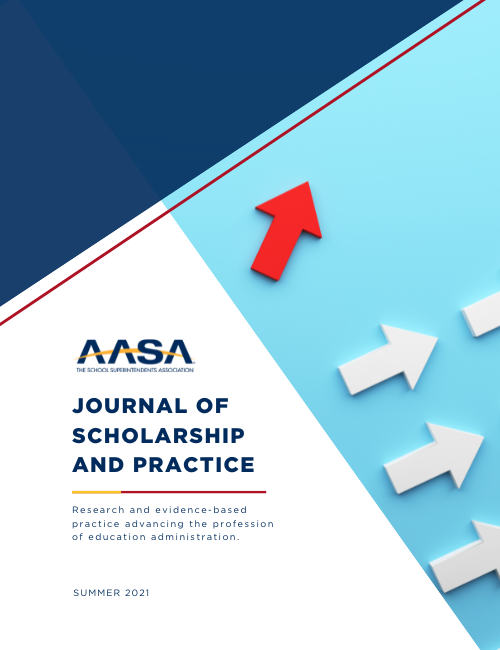2021 Summer Journal of Scholarship and Practice

The editorial written by Ken Mitchell, "Parts = Wholes: Collaboration in the Complex System," reflects on a recent blog by Larry Cuban titled "Nested Organizations: Public Schooling is Complex." Cuban cautioned that teachers and parents often lack an appreciation for system complexities that affect K-12 policy—the micro and the macro. Such underestimation often presents, Cuban says, policy and organizational challenges for leaders at the building and district levels. Hence, leaders who oversee complex systems—the parts and wholes of them—will benefit from periodic recalibrations of perspectives about their work. Cuban's observations in his blog, along with the findings of researchers in this issue of the Journal, will assist in that process.
This issue's researchers examine how and why today's school leaders can adapt to the inevitable and constant turbulence within both the smaller units and the whole system to advance their work.
In their exploratory qualitative study, "Leading Deep Learning," David Boren, Joseph Backman, Amy Miner, and Michael Owens strive to understand what happens when principals take a system-wide perspective in three areas of leadership: vision for learning, leadership approach, and mindset toward others to strengthen engagement for deeper student learning.
In their correlational quantitative study, “The Relationship Between Distributive Leadership, School Culture, and Teacher Self-Efficacy at the Middle School Level,” Anthony DeMarco and Daniel Gutmore examine the extent to which relationships exist between distributed leadership, school culture and the self-efficacy of teachers. The middle school organization, the central cog in the larger K-12 system, is a whole unto itself. They describe a need for school leadership to adopt a holistic framework for leading large complex organizations such as middle schools.
The premise that the whole is reliant upon or equal to the part is also the focus of a new textbook, Developing the Organizational Culture of the Central Office: Collaboration, Connectivity, and Coherence (2021) by Sally Zepeda, Mary Lynne Derrington, and Philip Lanoue. In her book review, Brenda Myers conveys the authors’ recommendations that “Understanding the totality of the system allows central office leaders to leverage their collective resources effectively towards school and district improvement.”
Advertisement
Additional Articles
-
Leading Deep Learning
How the leadership of 11 principals impacted their schools’ level of engagement in a district-wide deep learning initiative.
-
The Relationship Between Distributive Leadership, School Culture, and Teacher Self-Efficacy at the Middle School Level
The results indicate the need for school leadership to adopt a holistic framework for leading large complex organizations such as middle schools.
Advertisement
Advertisement



